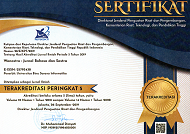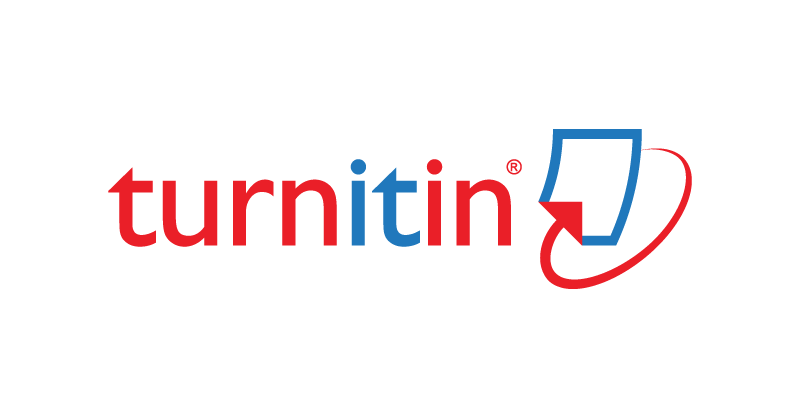The Speaking Skill by Using Slang Words in a Movie through Mind-Mapping Strategy
Abstract
The main objective of this study is to apply the teaching of speaking English through mind mapping strategy for the students at the English Department of Bina Sarana Informatika University. The participants included 20 students in the third semester. Speaking is an important skill in English language learning which is used by the students to communicate in their class and daily activities as a way of learning practice. By this mind mapping strategy, this paper aims at showing that this strategy can be implemented to get active speaking skills. This research uses a qualitative method to describe the practice application of classroom observations and the emerging themes of the original slang words gained through watching a movie. The data were carried out by observing, documenting, and interviewing students about the speaking teaching-learning process in the classroom using the English slang words in a movie with a mind-mapping strategy. The data was analyzed and focused on classroom practice directly related to the use of slang words in a movie and the mind-mapping strategy. The results showed that implementing a mind-mapping strategy through slang words in a movie can be conducted by knowing the meaning of the slang word in the movie, mapping the slang word into the sentence, and practicing the slang word in the student’s conversation. This mind-mapping strategy is effective in helping the EFL students to enrich their vocabularies, enhance their memory in making conversation, and remember the material easier and more creatively.
Full Text:
PDFReferences
Aydin, G., Baysan, S., & Aydoğan, S. (2017). Perceptions in the Mind Maps of Turkish Children Living in England at Primary Education Level about their Home Country Turkey and the World. International Journal of Languages’ Education and Teaching, 5(4), 521–541. https://doi.org/10.18298/ijlet.2418
Bahrani, T., & Sim, T. S. (2012). Audiovisual News, Cartoons, and Films as Sources of Authentic Language Input and Language Proficiency Enhancement. TOJET: The Turkish Online Journal of Educational Technology, 11(4), 56–64.
Boylu, E., & KardaÅŸ, D. (2020). The views of teachers and students on slang in teaching Turkish as a foreign language. Journal of Language and Linguistic Studies, 16(1), 73–88. https://doi.org/10.17263/jlls.712655
Cohen, A. D. (2014). Strategies in learning and using a second language (2nd edition). Routledge.
Collins, B., & Nyenhuis, R. (2020). The Effectiveness of Concept Maps for Students’ Learning and Retention. Https://Doi.Org/10.1080/15512169.2020.1775090, 17(S1), 897–909. https://doi.org/10.1080/15512169.2020.1775090
Dwijonagoro, S., Dwijonagoro, S., & Suparno, S. (2019). Pranatacara Learning: Modeling, mind mapping, E-Learning, or Hybrid Learning? Jurnal Cakrawala Pendidikan, 38(1), 156–173. https://doi.org/10.21831/cp.v38i1.23034
Elsherif, E., & Nsir, N. (2015). Introducing Slang to English Language Learners. Ohio TESOL Journal, 7(3), 6–9. https://ohiotesol.org/site/wp-content/uploads/2015/12/Ohio_TESOL_Journal_v7_n3.pdf
Goctu, R. (2017). Using Movies in EFL Classrooms. European Journal of Language and Literature, 8(1), 121. https://doi.org/10.26417/ejls.v8i1.p121-124
Guan, N., Song, J., & Li, D. (2018). On the advantages of computer multimedia-aided English teaching. Procedia Computer Science, 131, 727–732. https://doi.org/10.1016/J.PROCS.2018.04.317
Han, Y. (2019). Exploring multimedia, mobile learning, and place-based learning in linguacultural education. Language Learning & Technology, 23.(3), 29–38. https://doi.org/10125/44692
Hwang, G. J., Kuo, F. R., Chen, N. S., & Ho, H. J. (2014). Effects of an integrated concept mapping and web-based problem-solving approach on students’ learning achievements, perceptions and cognitive loads. Computers and Education, 71, 77–86. https://doi.org/10.1016/j.compedu.2013.09.013
Ismail, N. M. (2017). “That’s the biggest impact!” Pedagogical values of movies in ELT classrooms. Studies in English Language and Education, 4(2), 216. https://doi.org/10.24815/siele.v4i2.6351
Jiang, Y. (2020). Application of the Mind Map in Learning English Vocabulary. OALib, 07(06), 1–4. https://doi.org/10.4236/oalib.1106484
Johnson, L. (2015). ScholarWorks Vocabulary Strategies in an Elementary Classroom in a Third World Country [Walden University]. http://scholarworks.waldenu.edu/dissertations
Kabooha, R. H. (2016). Using Movies in EFL Classrooms: A Study Conducted at the English Language Institute (ELI), King Abdul-Aziz University. English Language Teaching, 9(3), 248–257. https://doi.org/10.5539/elt.v9n3p248
Khan, A. (2015). Using Films in the ESL Classroom to Improve Communication Skills of Non-Native Learners. International Journal for Teachers of English, 5(4), 46–52. http://www.eltvoices.in
Liu, P.-L. (2016). Mobile English Vocabulary Learning Based On Concept-Mapping Strategy. 20, 128–141. http://llt.msu.edu/issues/october2016/liu.pdfhttp://llt.msu.edu/issues/october2016/liu.pdf
Miller, Z. F., & Maloney, J. (2016). Review of Language Learning with Digital Video (Vol. 20, Issue 1). http://llt.msu.edu/issues/february2016/review3.pdf
Moore, D. W., & Readence, J. E. (1984). A Quantitative and Qualitative Review of Graphic Organizer Research. The Journal of Educational Research, 78(1), 11–17. https://doi.org/10.2307/27540086
Morfidi, E., Mikropoulos, A., & Rogdaki, A. (2018). Using concept mapping to improve poor readers’ understanding of expository text. Education and Information Technologies, 23(1), 271–286. https://doi.org/10.1007/S10639-017-9600-7/METRICS
Sako, T. (2022). The Influence of Debates in High School English Education on Students’ Critical Thinking. Studies in Language Teaching, 45. https://www.jstage.jst.go.jp/article/selt/45/0/45_37/_pdf/-char/en
Sandigan, A. P. D. (2018). Oral Communicative Competence of Filipino College Students: Levels, Correlates, and Characteristics. International Journal of English Literature and Social Sciences (IJELS), 3(5), 791–795. https://doi.org/10.22161/ijels.3.5.15
Wang, L. (2019). Research on the Application of the Mind Map in English Grammar Teaching. Theory and Practice in Language Studies, 9(8), 990–995. https://doi.org/10.17507/tpls.0908.15
Wang, X., & Dostál, J. (2018). Using a mind map to learn English vocabulary. ACM International Conference Proceeding Series, 150–153. https://doi.org/10.1145/3291078.3291121
DOI: https://doi.org/10.31294/wanastra.v15i1.14804
Copyright (c) 2023 Baiatun Nisa, Sulhizah Wulan Sari, Rr Nabila Wahyu Apriyanti, Paramita Kusumawardhani

This work is licensed under a Creative Commons Attribution-ShareAlike 4.0 International License.
Index by:
Published by Department of Research and Community Service (LPPM) Universitas Bina Sarana Informatika by supported Relawan Jurnal Indonesia
Jl. Kramat Raya No.98, Kwitang, Kec. Senen, Jakarta Pusat, DKI Jakarta 10450

This work is licensed under a Creative Commons Attribution-ShareAlike 4.0 International License







